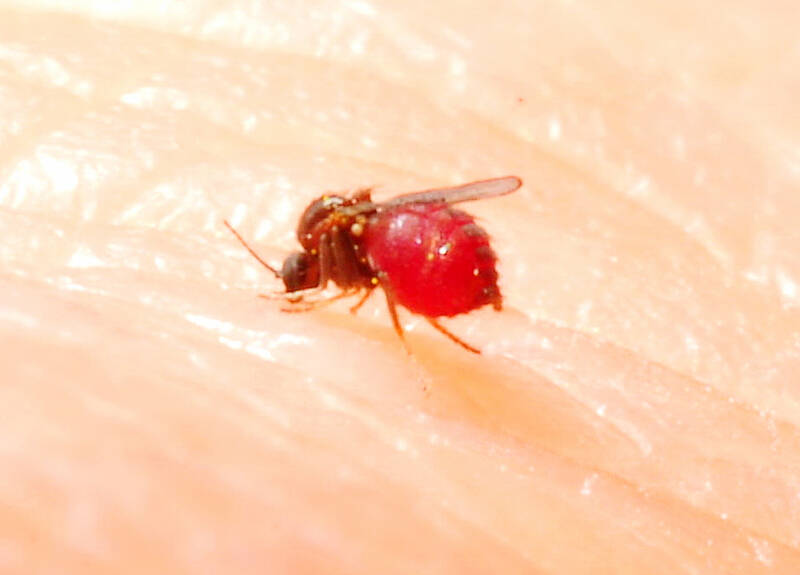Taiwanese scientists have cracked the genetic code of a tiny bloodsucker in an advancement of research on repellant and insecticide development, a study published this month in the journal Insect Biochemistry and Molecular Biology showed.
Forcipomyia taiwana, commonly known in Chinese as the “tiny black mosquito” (小黑蚊), is a species of blood-sucking insect that “wreaks havoc” throughout Taiwan, the Ministry of Health and Welfare said.
Understanding the receptors that enable the sense of smell in female tiny black mosquitoes is a crucial step in creating lures for traps or repellents, said Lin Ming-te (林明德), study coauthor and associate professor at Tzu Chi University’s Department of Molecular Biology and Human Genetics

Photo: Hua Meng-ching, Taipei Times
The team’s analysis of the blood-sucking midges’ genetic materials revealed that they possess 134 of 156 unique olfactory receptors of the Ceratopogonidae family, he told a news conference in Hualien yesterday.
Many of the midges’ olfactory receptors find expression only in females, the sex of the species that bite humans for blood before laying eggs during the spawning season, Lin said.
This means chemicals can be developed to target the receptors, he said.
Extracting enough genetic material to analyze the insect was difficult because they are miniscule, only about one-third the size of common fruit flies, he said, adding that the team scoured the campus for samples.
The significant variation between the genetics of each midge frustrated the genome assembly, Lin said.
The team found that the genetic material could be harvested from a clutch of 20 eggs laid by the same female, eliminating the variation problem, he said.
A complete map of the midge’s genes opens the way for further research into identifying any resistance the insect might have to insecticides, and the history and path of their evolution and spread, Lin said.
The team plans to publish the complete genome of the tiny black mosquito on a open-access Web site to encourage further study of the species, he said.

The Ministry of Education (MOE) is to launch a new program to encourage international students to stay in Taiwan and explore job opportunities here after graduation, Deputy Minister of Education Yeh Ping-cheng (葉丙成) said on Friday. The government would provide full scholarships for international students to further their studies for two years in Taiwan, so those who want to pursue a master’s degree can consider applying for the program, he said. The fields included are science, technology, engineering, mathematics, semiconductors and finance, Yeh added. The program, called “Intense 2+2,” would also assist international students who completed the two years of further studies in

Former president Tsai Ing-wen (蔡英文) departed for Europe on Friday night, with planned stops in Lithuania and Denmark. Tsai arrived at Taiwan Taoyuan International Airport on Friday night, but did not speak to reporters before departing. Tsai wrote on social media later that the purpose of the trip was to reaffirm the commitment of Taiwanese to working with democratic allies to promote regional security and stability, upholding freedom and democracy, and defending their homeland. She also expressed hope that through joint efforts, Taiwan and Europe would continue to be partners building up economic resilience on the global stage. The former president was to first

Former president Tsai Ing-wen (蔡英文) on Monday called for greater cooperation between Taiwan, Lithuania and the EU to counter threats to information security, including attacks on undersea cables and other critical infrastructure. In a speech at Vilnius University in the Lithuanian capital, Tsai highlighted recent incidents in which vital undersea cables — essential for cross-border data transmission — were severed in the Taiwan Strait and the Baltic Sea over the past year. Taiwanese authorities suspect Chinese sabotage in the incidents near Taiwan’s waters, while EU leaders have said Russia is the likely culprit behind similar breaches in the Baltic. “Taiwan and our European

The Taipei District Court sentenced babysitters Liu Tsai-hsuan (劉彩萱) and Liu Jou-lin (劉若琳) to life and 18 years in prison respectively today for causing the death of a one-year-old boy in December 2023. The Taipei District Prosecutors’ Office said that Liu Tsai-hsuan was entrusted with the care of a one-year-old boy, nicknamed Kai Kai (剴剴), in August 2023 by the Child Welfare League Foundation. From Sept. 1 to Dec. 23 that year, she and her sister Liu Jou-lin allegedly committed acts of abuse against the boy, who was rushed to the hospital with severe injuries on Dec. 24, 2023, but did not